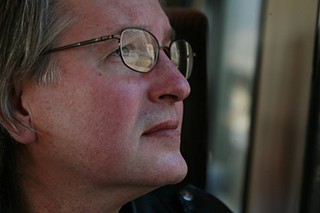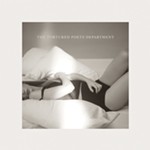SXSWi: Bruce Sterling
Bruce Sterling speaks
By Marc Savlov, 10:33PM, Mon. Mar. 16, 2009
For starters, let's just say it's much, much worse than we previously assumed. All of it: writing, publishing, journalism, the relationship of a writer of words to a world where words are increasingly devalued or re-valued in new and arcane ways that nobody quite understands yet. Hard times for the literati: incoming.
Those of us looking for some comfort from Austinite-by-way-of-Italy and Wired magazine's "Visionary-in-residence", former thrower of the best SXSW interactive parties ever, and the man behind Mirrorshades, author-futurist Bruce Sterling, didn't find much to smile (or even scowl) about at his annual SXSWi pow-wow.
For one thing, Sterling looked physically older, tired, and sounded, despite some audience-tweaking snarkasm, downright melancholic. This was not the relatively optimistic Hacker Crackdow cyberpunk Sterling, and listening to what he came to say was a sobering and borderline unnerving experience. (Although, it must be noted, Sterling continues to remind us how important it is to be optimistic and proactive, especially in times of severe economic crises.) According to Sterling, it's not a good time to be a writer or even tangentially aligned to the literary arts.
The SRO audience -- Web 2.0 Twitterers and pomo journos alike -- exited Conference Hall A wearing the glazed expressions of people who were just informed they have boarded the wrong train and are not, in fact, heading off to some sort of digital Walden Pond but are instead scheduled to disembark at the literary equivalent of Treblinka. So not good.
With that in mind, we've culled the least disturbing topics from Sterling's talk and broken them down into what will be three different raw, mostly unexpurgated-Sterling blog posts, of which this is the first. Brace yourself.
"Look," said Sterling, pulling out a stack of copies of his most recent novel, The Caryatids, and placing it on the lectern. "These are what we used to call books. I know that you're sort of unused to seeing them. Let me explain to you how these devices work because I'm not sure a Web 2.0 crowd follows the structure anymore.
"What I do is I write a lot of words in a row. I mean, like, a whole lot of words, not even character-count, but actual words. Then I go back and I restructure them and move them into other sort of methods. In theory they have a dramatic arc and a denouement and a coherent story line. And then I send those to my agent who then sends them to an editor who then sends them to either a higher-ranking editor or a publisher...who then moves them through a distributor, who is really kind of the magic key to the whole business because he's really the guy paying for a lot of the author-cult activities like the signing tours and the book store tours.
"And then it would go out to either to a large number of independent book stores or chain stores and then it would be retailed and people would pay money for it.
"That whole business has hit the skids, in the United States in particular. Publishing has never been, in my lifetime, in such a powerless state as it is now. It's really taking it in the chin from every level. Normally in this production system, if you were an author, you got maybe four-percent to eight-percent of a not-very-accurate royalty system. But that was okay, because you were considered a kind of bonkers-creative, unstable guy, probably with multiple marriages and an alcohol problem.
"...As an author-journalist I actually feel much more sorrow for the state of editors and publishers than I do for that of my fellow authors. Journalists are being annihilated across the board. They're really going fast. Guys winning Pulitzer prizes at the Denver Post are losing their jobs. So this leaves me in a powerless relationship to this [gesturing to the book] artifact. Which basically the way I relate to my audiences.
So what to do with the books? Sterling continued: "At first I thought I'd spam the audience with the books at first. I could simply hurl them at random. And they might hurt or blind somebody or perhaps break one of their computers. Then I thought maybe I could leave them under the seats...but that sounded kind of corny. Then I thought maybe I could bury them in geo-locative caches. I could just leave cryptic little remarks and then if nobody picked them up maybe somebody else would unearth them in 200 years. That would be kind of a victory condition in and of itself."
A note to readers: Bold and uncensored, The Austin Chronicle has been Austin’s independent news source for over 40 years, expressing the community’s political and environmental concerns and supporting its active cultural scene. Now more than ever, we need your support to continue supplying Austin with independent, free press. If real news is important to you, please consider making a donation of $5, $10 or whatever you can afford, to help keep our journalism on stands.
Lina Fisher, March 11, 2022
Michael King, March 16, 2017
Aug. 7, 2022
April 29, 2022
SXSW, Bruce Sterling, SXSW interactive











